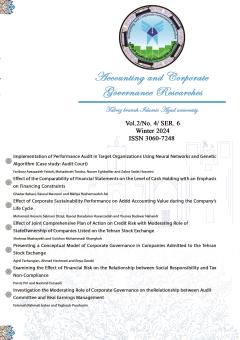The Effect of the Financial Statement Comparability on the Cash Holdings with Emphasis on Financing Constraints
Subject Areas : Financial accounting
Ghader Babaei
1
*
![]() ,
Rasoul Masroori
2
,
Mahya Hashemzadeh asl
3
,
Rasoul Masroori
2
,
Mahya Hashemzadeh asl
3
1 - Assistant Prof, Department of Accounting, Azarshahr Branch, Islamic Azad University, Azarshahr, Iran
2 - Accounting(Ph.D), Department of Accounting, Tabriz Branch, Islamic Azad University, Tabriz, Iran
3 - MSc., Faculty of Accounting, Shams Institute of Science and Technology, Tabriz, Iran
Keywords: Financial statement comparability, Cash holding, Financing constraints,
Abstract :
Financial statement comparability is one of the main qualitative characteristics of related to providing information that adds to the usefulness of information. On the other hand, cash inventory is also considered as one of the financial assets of the companies of great importance. Thus, this study examines the effect of the financial statement comparability on the cash holdings with emphasis on financing constraints. For measure the financial statement comparability we used De Franco’s model and for measure the cash holding used the Ozkan & Ozkan’s model. To achieve the study’s purpose, 847 views from 121 companies accepted in Tehran Stock Exchange were selected through systematic elimination sampling method during the period 2015 to 2021 and tested by multivariable regression. The results of the research show that the financial statement comparability has a negative and significant effect on the cash holdings and reduces it. And the interaction of financing constraints with financial statement comparability has a positive and significant effect on the cash holdings. In other words, financing constraints decrease the negative effect of financial statement comparability on the cash holdings. According to the results, financial statement comparability increases the overall quantity and quality of information available to corporate outsiders, firms with comparable financial statements should face lower financing and, hence, less need for holding cash.

